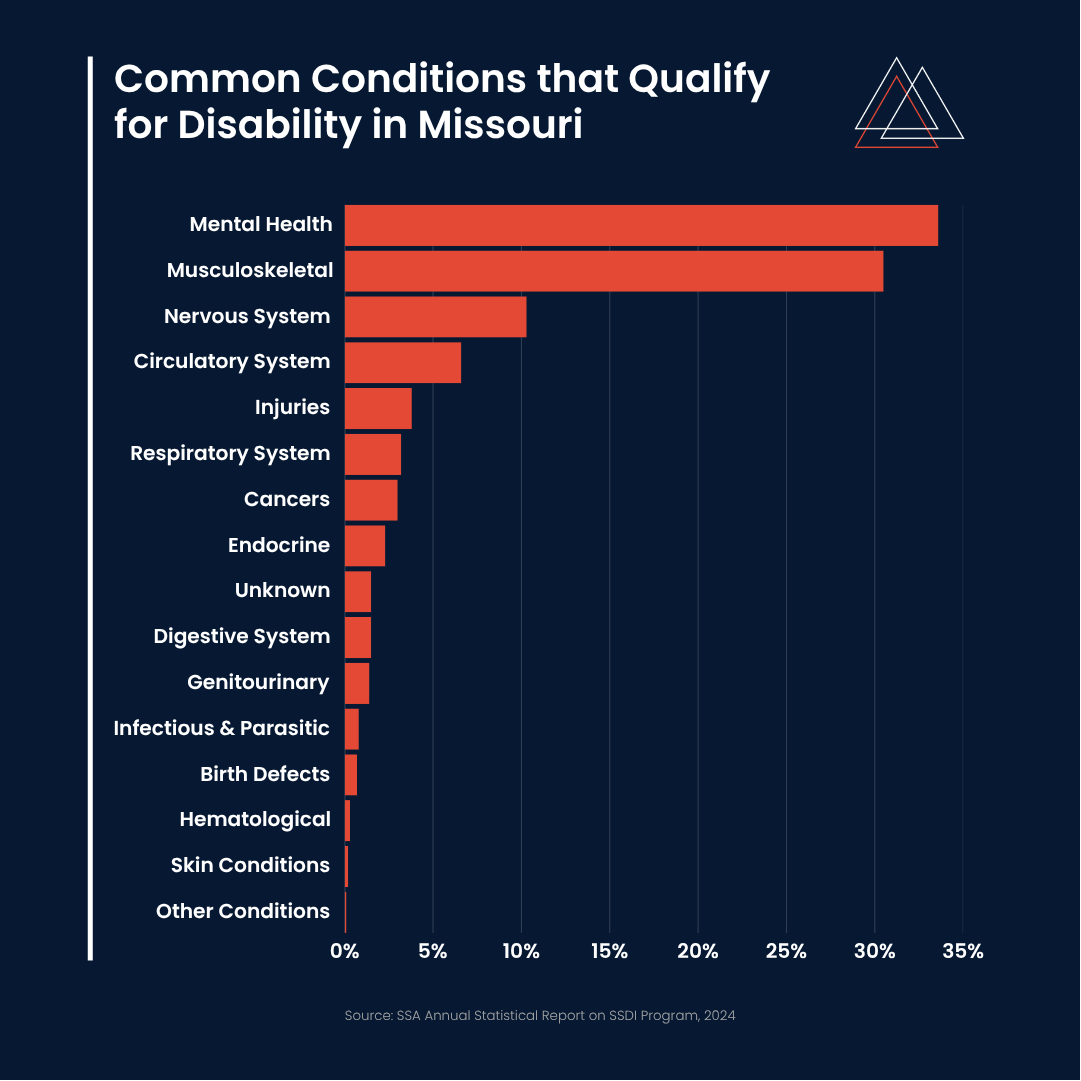What Conditions Qualify for Disability in Missouri?
October 20, 2025
Fact Checked
If you live in Missouri and have a disabling condition that limits your ability to work, you may qualify for financial assistance through federal programs such as Social Security Disability Insurance (SSDI) or Supplemental Security Insurance (SSI).
This article will explore the most common conditions that qualify for disability benefits in Missouri, along with the basic requirements to be eligible for SSDI and SSI.
Common Conditions Qualifying for Disability in Missouri
The Social Security Administration (SSA) provides a "Blue Book" outlining medical conditions deemed severe enough to qualify for Social Security disability benefits. In Missouri, the common conditions that qualify for benefits are:
Mental health conditions –33.6%
Depressive, bipolar, and related disorders –10.4%
Intellectual disorders – 9.5%
Other mental disorders – 4.8%
Schizophrenia spectrum and other psychotic disorders – 4.5%
Childhood and adolescent disorders not elsewhere classified – 0.06%
Neurocognitive disorders – 2.6%
Autism spectrum disorders – 1.5%
Developmental disorders – 0.13%
Musculoskeletal disorders and connective tissue disorders – 30.5%
Neurological disorders – 10.3%
Cardiovascular disorders – 6.6%
Injuries – 3.8%
Respiratory disorders – 3.2%
Cancers (neoplasms) – 3.0%
Endocrine disorders – 2.3%
Unknown – 1.5%
Digestive disorders – 1.5%
Genitourinary disorders (kidney disease) – 1.4%
Infectious and parasitic diseases – 0.8%
Congenital disorders (birth defects) – 0.7%
Hematological disorders – 0.3%
Skin disorders and subcutaneous tissue conditions – 0.2%
Other – 0.1%
Even if your condition isn't on the list, you can still qualify if you can prove that your condition significantly limits your ability to perform work activities.
Criteria to Qualify for Disability Benefits in Missouri
Applicants must meet specific medical and financial criteria to be eligible for SSDI or SSI benefits in Missouri.
Social Security Disability Insurance (SSDI) Eligibility Criteria
Have a Disabling Medical Condition: Your condition must greatly limit your capacity to engage in Substantial Gainful Activity (SGA). The SSA provides a "Listing of Impairments", which outlines conditions deemed severe enough to prevent a person from working. Even if your specific condition is not included, you might still be eligible if you can prove your disability is of equivalent severity.
Have a Long-Term Disability: The condition must be anticipated to persist for at least 12 months or lead to death. Temporary or short-term conditions generally do not meet the criteria for SSDI benefits.
Accumulated Enough Work Credits: SSDI is intended for those with an adequate work history. Typically, 40 work credits are required, with 20 of them earned within the past decade. Nonetheless, younger individuals may be eligible with fewer credits.
Have an Income That Doesn't Exceed Established Limits: While SSDI benefits are not means-tested, engaging in Substantial Gainful Activity (SGA) can affect eligibility. In 2025, earning more than $1,620 ($2,700 if you are blind) is considered SGA and could disqualify you from receiving benefits.
Supplemental Security Income (SSI) Eligibility Criteria
You Must Have a Qualifying Disability: SSI requires that you have a medical condition that severely limits your ability to work and is expected to last a year or result in death.
Assets Must Be Below Allowable Levels: SSI is for people with low income and resources. Applicants can have up to $2,000 in assets for individuals or $3,000 for couples. Assets include cash, bank accounts, and property, but not your main home or one vehicle.
You Must be a United States Resident: Anyone who applies must be a resident of the United States of America, the District of Columbia, or the Northern Mariana Islands. They are also required to be either a US citizen or a qualifying non-citizen.
Get Expert Help Applying for Benefits
Understanding SSI and SSDI benefits can feel overwhelming, especially with all the paperwork involved. Unfortunately, many first-time applications are denied– often due to missing medical evidence or simple mistakes on the initial application.
Working with a disability lawyer can make the application process easier and improve your chances of approval. Here's how a disability lawyer can help:
Review your claim before you submit it to reduce the chance of denial
Coordinate with your doctors to make sure medical records match SSA criteria
Gather evidence showing how your condition affects your daily life
Represent you during appeals or at a disability hearing
Handle the legal details so you can focus on your health
An experienced attorney can help gather the right documents, make sure your application is complete, and stand by your side during appeals if necessary. Contact our law firm today for a free assessment.


